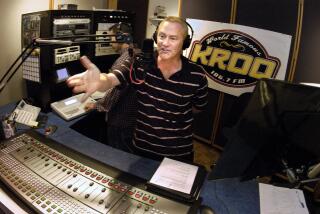KLOS Takes a Page From Glory Days of Rock Wars
- Share via
Jim Ladd brings his thematic classic rock programming and outspoken social commentary back to the air today, taking over the 6 to 10 p.m. weekday evening slots on KLOS-FM (95.5). Ladd, returning for his third stint at the station since the mid-’70s, is joined by several other familiar voices in a new KLOS lineup that gives the station a strong connection to the glory years of the ‘70s and ‘80s when it and the now-defunct KMET-FM battled it out as Los Angeles’ top rock outlets.
KLOS veteran Rita Wilde, who is also the station’s music director, will move from her role as news reader and sidekick for the morning “Mark & Brian Show” into a regular 10 a.m. to 2 p.m. slot. Garth Kent, who spent two years at KMET in the ‘80s, returns to L.A. for the 2 to 6 p.m. show. Raechel Donahue, who co-founded KMET’s rock format with her late husband, Tom Donahue, will become a weekend regular, and negotiations are in progress to bring in Dr. Demento’s weekly novelty-music showcase, which was a longtime KMET staple.
Also returning to KLOS is Chuck Moshontz, who will assume Wilde’s news duties on “Mark & Brian,” the same role he had served before leaving three years ago for adult alternative station KSCA-FM (101.9), which was sold and switched to a Spanish-language format earlier this year.
Ladd, whose last full-time radio gig was at the classic-rock format KLSX-FM (97.1) before it converted to talk programming two years ago, insists that this is not an attempt to re-create the old KLOS-KMET sound.
“If you try to do that, you’re looking backwards,” he says. “And having been privileged to be part of that, the one thing I learned is that we were forward-looking people.”
Program director John Duncan says that while the core of the station’s music programming will be classic rock, he cites Matchbox 20, the Wallflowers and young blues rocker Corey Stevens among the newer acts that will remain crucial to the KLOS format.
“We’re targeting baby boomers who grew up with rock ‘n’ roll but don’t want to be stuck in the ‘70s,” he says.
More to Read
The biggest entertainment stories
Get our big stories about Hollywood, film, television, music, arts, culture and more right in your inbox as soon as they publish.
You may occasionally receive promotional content from the Los Angeles Times.









